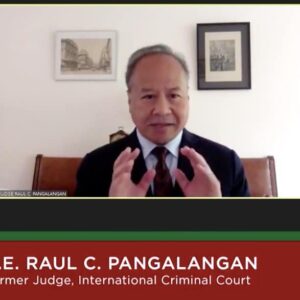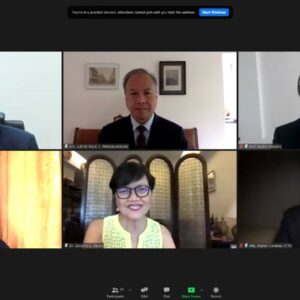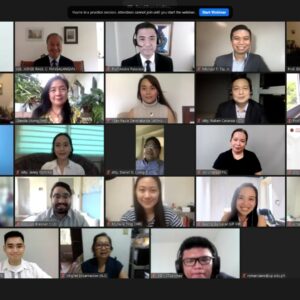UP IHR, UP IILS, IBP webinar highlights role of ICC in Drug War probe, prosecution of crimes against humanity
To assist the public in understanding the nature of crimes against humanity and its implications on the efforts to seek effective remedy, the UP Institute of Human Rights (UP IHR) and the UP Institute of International Legal Studies (UP IILS), in partnership with the Integrated Bar of the Philippines (IBP), co-organized the webinar entitled “Crimes against Humanity and the International Criminal Court: Nature, Procedure, and Implication on the Philippine Situation” via Zoom and Facebook Live. Held on 25 June 2021, the event aimed to contribute to the general vision of an informed and empowered Filipino by presenting a clearer picture into the probe of the International Criminal Court (ICC) on President Rodrigo Duterte’s war on drugs.
UP College of Law Dean Edgardo Carlo Vistan II opened the event by explaining the relevance of international law to the everyday lives of Filipinos, noting how the nation has sought recourse from various international institutions. UP IHR Director Professor Elizabeth H. Aguiling-Pangalangan then framed the discussion in light of misinformation on the work of the ICC and its role in exacting accountability from perpetrators of international crimes.
The first part of the forum featured the lecture of Judge Raul C. Pangalangan, former Judge and President of the Trial Chamber of the International Criminal Court (ICC), and Professor at the UP College of Law, on the nature of crimes against humanity and the procedural elements of its prosecution. First, Judge Pangalangan described the procedure required in the ICC. He clarified that the request made by the ICC Chief Prosecutor Fatou Bensouda, asking for a full probe on President Rodrigo Duterte’s drug war, is the result of a preliminary examination on the matter. Judge Pangalangan added that there is now a pending request in the pre-trial chamber and assuming it is granted, the victims may make representations. Secondly, he emphasized that the ICC retains jurisdiction over the actions of a State even after its withdrawal from the Court for all crimes committed in its territory before its withdrawal. Thirdly, Judge Pangalangan discussed the substantive aspect of the issue, paying special focus on the elements of the crimes of humanity of murder and torture as well as the various modes of liability. He stated that once there is a confirmation of the charges, a trial chamber will be formed and trial will commence. Lastly, he ended by stating that the ICC respects all the parties and counsels who come before it, and never loses sight of its purpose which is to end impunity and protect the victims.
In the open forum for the first segment, questions were raised by audience members as regards the implementation and enforcement of ICC decisions. Judge Pangalangan responded by stating that there is no such thing as a global police. He added that cooperation is instrumental in the implementation and enforcement of ICC decisions.
The second part of the forum involved a panel of experts who explored the consequences of the ICC’s inquiry into the drug war, as well as their analysis of specific parts of the ICC procedure concerning the Philippines. Prof. Andre C. Palacios of the UP College of Law and Chairperson of the IBP International Law and International Affairs Committee, discussed the implications of the ICC investigation under Philippine law by laying down the procedure for investigation and stressing the general obligation of States to cooperate fully with the Court. Atty. Ruben Carranza, Senior Expert of the International Center for Transitional Justice, emphasized the various ways victims can engage the ICC and the possible protection measures that can be taken for victims and witnesses. A key point made in his presentation was that the war on drugs is a class war, and the ones who have been killed are predominantly poor Filipinos. Lastly, Dr. Socorro L. Reyes, Regional Governance Adviser of the Center for Legislative Development, highlighted the specific impact of extrajudicial killings on women, as well as the practical challenges in providing reparations.
During the open forum, the panel addressed several questions on the implications of the ICC’s probe on national and regional institutions. Prof. Palacios explained that the Philippine government, including the Commission on Human Rights, has no international obligation to cooperate with the ICC since the country’s withdrawal from the Rome Statute. Meanwhile, Atty. Carranza underscored the importance of national processes in seeking political accountability, citing the case of Sudan’s Al Bashir as an example. Lastly, Dr. Reyes explained that reparation processes heavily depend on the government’s commitment, as seen from the experience relating to the enactment of laws relating to reparations for human rights victims during Martial Law of Marcos.
Atty. Domingo “Egon” Cayosa, National President of the IBP, closed the forum and stressed the duty of the legal community in understanding how the ICC works and, in turn, help explain this to the general public.
The moderators for the event were Prof. Michael Tiu, Jr. and Atty. Jenny Domino of the UP College of Law, together with Atty. Joan Paula Deveraturda of UP IILS.
Watch the webinar here – https://bit.ly/CrimesAgainstHumanityandtheICC










































































































 on the upper right corner to select a video.
on the upper right corner to select a video.